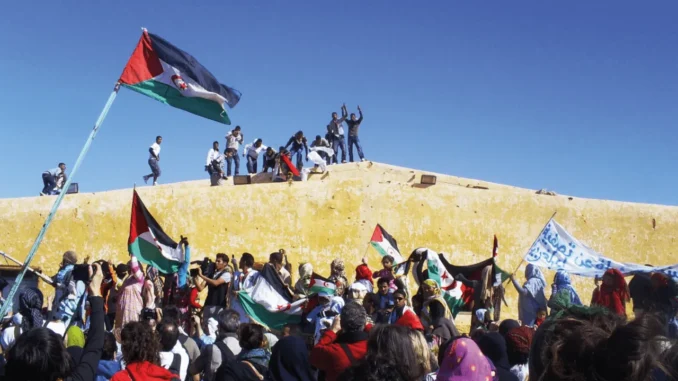
This is the phrase that sealed the Nairobi meeting’s commitment to self-determination. This article describes how the identity of a people was forged in the fight against powerful enemies. The sufferings of the present are anchored to unresolved problems of the past. It is essential to start from them to outline a different future.
Chaiaa Ahmed Baba Beiruk
Ruben Tzanoff
The origin of Spanish domination
Spanish imperialism established its interests in the region after the triumph over the Sultanate of Morocco in the African War. Its subsequent consolidation occurred within the framework of the dispute with the other expanding European imperialists. The differences between them were attenuated with the division of the continent at the Berlin Conference, complemented by successive negotiations. Even so, it was only in 1946 when the territories under Iberian influence acquired the status of Spanish West Africa, administrative tutelage under which the Sahara remained. At that time, the Sahrawi people already had their own identity and culture shaped by centuries of nomadic coexistence in the desert.
They pass the baton from one kingdom to another
The artificial division of peoples by imperial diplomats and traitors, plunder, genocide and oppression created the conditions for the emergence of a powerful continental demand for liberation that lasted about twenty-five years. As a result, African decolonization was imposed which, although it was later structured into formal independence, meant a first triumph that, unfortunately, Western Sahara did not obtain.
Throughout the process, Spain was a late expression of imperialist languishing since, even weakened, it maintained a presence in Africa until 1975. The invasion of the Sahara was consummated with the Green March, organized by Morocco with the support of the US and France and with the Madrid Accords (Spain, Morocco and Mauritania) of 1975 that divided its territory. At the same time, it coincided with the death of the fascist dictator Francisco Franco. In fact, the last Spanish soldiers gave the Moroccans the keys to a house they had usurped.
The complicity of the UN
At that time, the UN distanced itself from the Madrid Accords and pointed out the Spanish abandonment of its responsibilities as an administrative power. It later placed Western Sahara on the list of the seventeen non-self-governing territories of the Special Committee on Decolonization and created the United Nations Mission for the Referendum in Western Sahara (MINURSO). After almost 30 years, the UN policy yielded an unequivocal result: it did not guarantee the referendum, it paved the way for Mohamed VI’s deceitful autonomy plan and strengthened the occupation.
Looting by land and sea
The territory is rich in phosphate mines that are exploited by the Moroccan state company OCP Group and several multinational companies. It is a globally coveted mineral since it is used for the production of fertilizers and is the main unconventional source of uranium. Maritime oil prospecting is yielding good results off Boujdour, but the essential maritime plundering is carried out by European fleets through fishing agreements between Morocco and the European Union without the consent of the Polisario Front. Meanwhile, the Sahrawis who remain in the invaded lands live in absolute poverty, like those in the Refugee Camps who, in addition, are fed largely thanks to international charity.
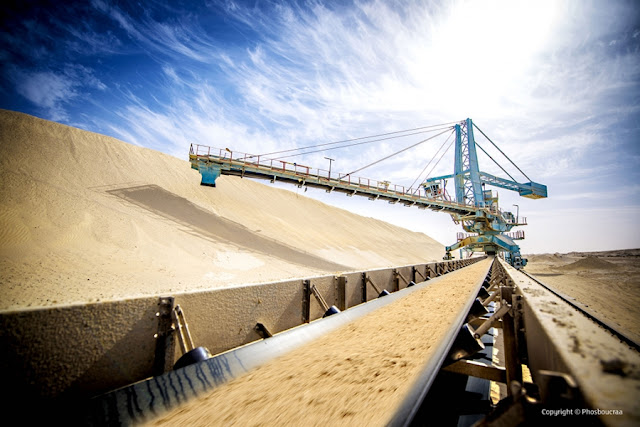
Repression to guarantee profits
In 1980, the Moroccan monarchical regime built the Security Wall, which many people identify as the Wall of Shame, since it is as anti-human as the Israeli Barrier in the West Bank built by Zionism. It is a fortification three meters high and 2,720 kilometers long, with bunkers, arsenals and planted with anti-personnel mines to protect the stolen mineral exploitation, corner the Polisario and prevent the return of displaced people and their descendants to their homes of origin.
In European human rights organizations, the representations that denounce repression, persecution, imprisonment and torture in the occupied territories can be counted on the fingers of one hand. The abuses of women activists like Sultana Khaya came to light thanks to international solidarity campaigns. What is heard repeatedly in the forums are congratulations to Morocco for false “advances in human rights.” In the European Union, cynicism is practically institutionalized.
A worthy people always standing
The handover of the Sahara always met with the mobilized rejection of its population, whose future is intertwined with the Popular Front for the Liberation of Saguia el-Hamra and Río de Oro (Polisario Front). The Polisario was founded in 1973 as the legitimate representative of the Sahrawi national liberation movement against the Spanish occupation that ended in 1975. After the above-mentioned Madrid Accords, open war against the Moroccan-Mauritanian invasion began and the Polisario proclaimed the Sahrawi Arab Democratic Republic (SADR). During the conflict, the Sahrawi civilian population endured criminal bombings, including phosphorus and Napalm attacks. The Polisario constitutes at the same time the government and the Sahrawi armed resistance to the Moroccan occupation.
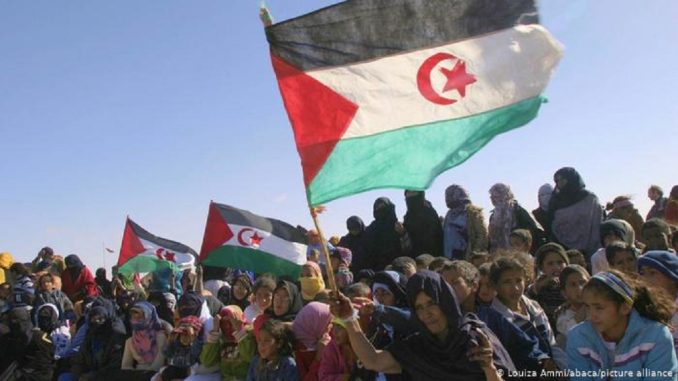
The Polisario defeated the Mauritanian forces and in 1991 there was a ceasefire due to the commitment of MINURSO to hold a referendum, but this did not materialize. The truce was extended until 2020, when the Moroccan army repressed a popular demonstration that blocked the Guerguerat crossing and the Polisario restarted war actions. Despite so many vicissitudes, the Sahrawi struggle continues on the front lines, in the occupied territories, in the camps and in exile, where the young generations have given new impetus to the mobilizations.
Chaiaa video about Guerguerat in Panorama International.
Autonomy is not self-determination
To try to channel the long conflict in his favor, Mohamed VI developed an autonomy plan that, based on some concessions, liquidated self-determination. North American imperialism supported the invasion initiative through Donald Trump and ratified it in the subsequent presidency of Joe Biden. Based on these events, other countries aligned themselves in the same direction. The authoritarian Moroccan regime deploys a diplomatic offensive that is not exempt from economic favors – via bilateral agreements – and disloyalties that, due to their scope, will transcend time.
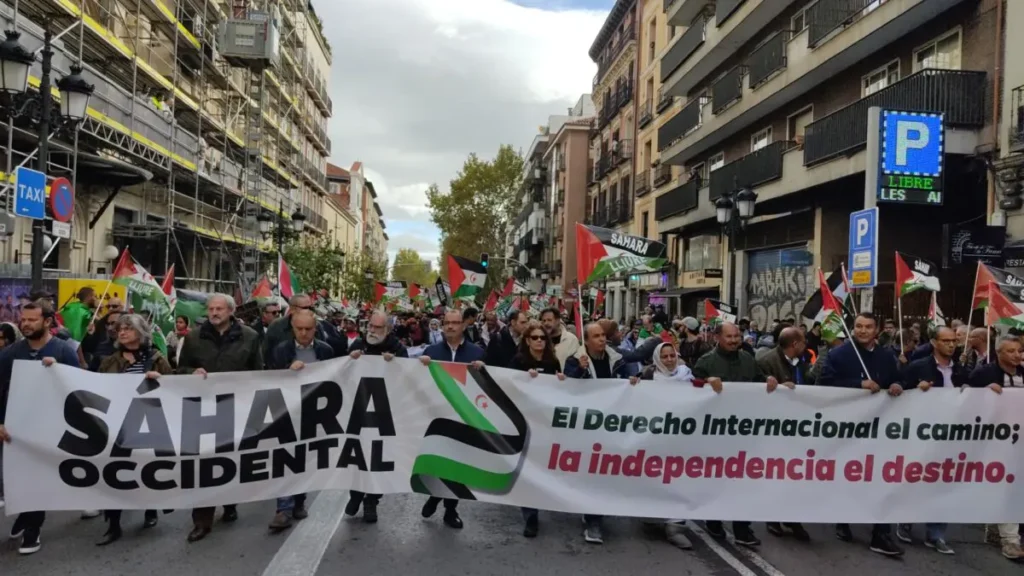
The historical betrayal of recognizing the State of Israel
Following the “recommendations” of the United States, the Alawite regime recognized the State of Israel and it in turn declared itself in favor of its sovereignty in the occupied territories, even announcing the possibility of opening a consulate in Dakhla, just 550 kilometers from El Aaiún, the most important city in the Sahara. The political, commercial and military pacts allowed the genocidal Zionists of the Palestinian people to set foot in the Maghreb. [1] It is an unforgivable betrayal to the Arab and African peoples and of all those in the world who defend Palestine.
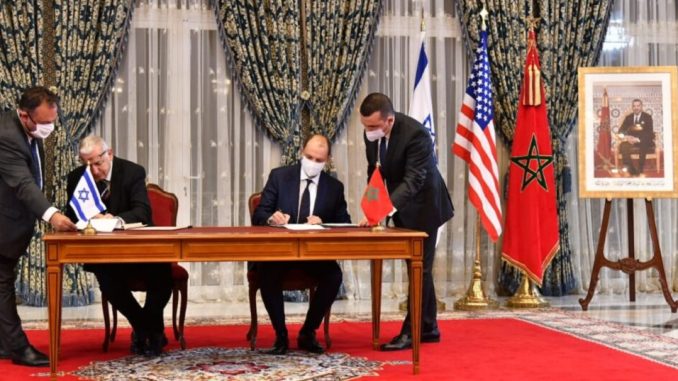
Sánchez also ignores Spanish responsibilities
President Pedro Sánchez of the “progressive coalition” PSOE- Podemos abandoned the historic Spanish position that, at least formally, recognized the right to self-determination. The shift towards the Moroccan autonomy plan was carried out to overcome the circumstantial distance that existed between the Kingdoms, facilitate the arrival of energy resources to the EU and have effective border repression of immigration. In this way, the ’78 regime synchronized perfectly with the Franco regime on one point: the abandonment of its responsibilities as an administrative power.
No half measures
In this conflict, there is no room for hesitation, there is a trench in which to position oneself and express: Morocco out of Western Sahara! Down with the autonomy plans of Mohamed VI! Long live Sahrawi self-determination! For the broadest unity of action for internationalist solidarity! Out with the imperialists and Zionists from Africa! Self-determination can only be achieved with the unity of the African and Arab peoples, together with the workers of the entire world. The Moroccan left, human rights activists and those who consider themselves progressive or democratic should take a brave step forward in defense of their brothers attacked in the Sahara and Palestine.
Socialism or barbarism
The recovery of the land, the exercise of sovereignty and the obtaining of freedom are two[1] [2] of the fundamental democratic problems to be resolved. However, as long as the world continues to be dominated by imperialist capitalism, inequality and the “Sword of Damocles” of barbarism will continue to swing over the head of humanity. Social justice and freedom will only draw their contours with the defeat of capitalist domination. And there will be a palpable reality with the construction of a system different from the current one, without exploiters, oppressors or bureaucrats, in which life is worth more than profits. It is a social and political construction that has a first and last name: socialism with workers’ democracy.
Surface, location and languages
Western Sahara has a territory of 266,000 KM2, located in North Africa, at the western end of the Sahara Desert facing the Atlantic. It is a region rich in natural resources such as phosphate, oil and fishing. In 2019, the population was 582,000 people. The ethnic group is Arab, the official language is Arabic, although the linguistic variant of Maghreb Arabic called Hassania is also used and in a minority the Spanish language.
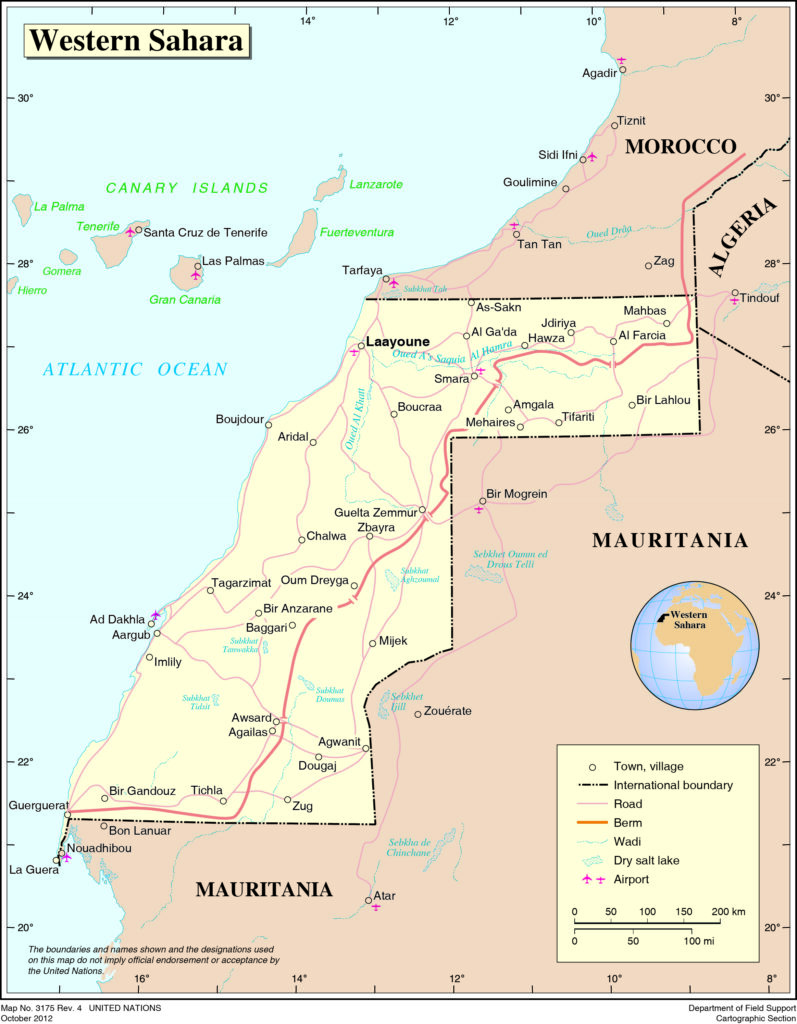
The Tindouf camps
There are five refugee camps founded in 1975 by the Polisario Front, located around Tindouf and Rabouni, in Algeria. The names of the towns (wilayas), which evoke occupied cities in the Sahara, are: El Aaiún, Auserd, Smara, Bojador and Dakhla. 173,600 people live there in the harshest climatic conditions that in summer are around fifty degrees Celsius, without running water, with weak and unstable electricity, in precarious adobe homes next to the traditional haimas.
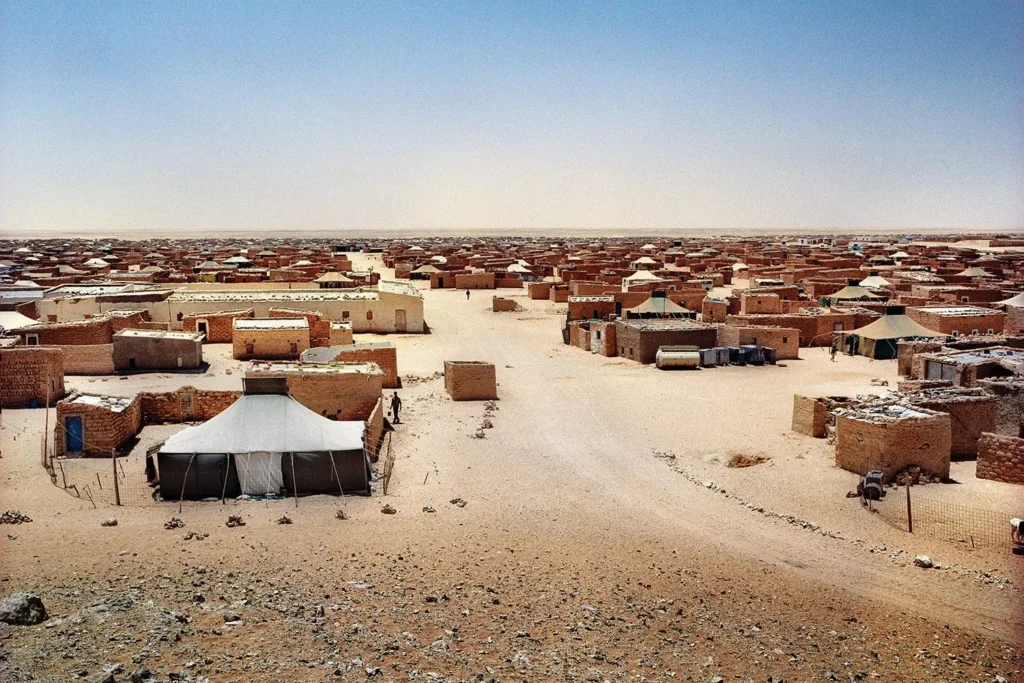
The House of Bourbon, from France, has held the Spanish throne since the 17th century. In recent history, Juan Carlos I, anointed by Franco, and his heir Felipe VI appear. The ‘Alawi dynasty dates back to 1631, and the last two exponents are Hassan II and his son Mohamed VI. They are reactionary, parasitic and corrupt monarchies, like the institutional regimes that house them. For both, the self-determination of peoples is an unacceptable fact.
Consistent support
The Pan-African Congress of the ISL embraced the Sahrawi cause. Our organization denounces the violation of human rights, promotes mobilizations to diplomatic representations of the Kingdom of Morocco, has been in the Tindouf Camps and participates in the annual demonstrations in the Spanish capital that denounce the signing of the Madrid Accords through which Spain ceded Western Sahara to Morocco and Mauritania (on November 14, 1975). Internationalist solidarity campaigns will not stop. Long live the Free Sahara!
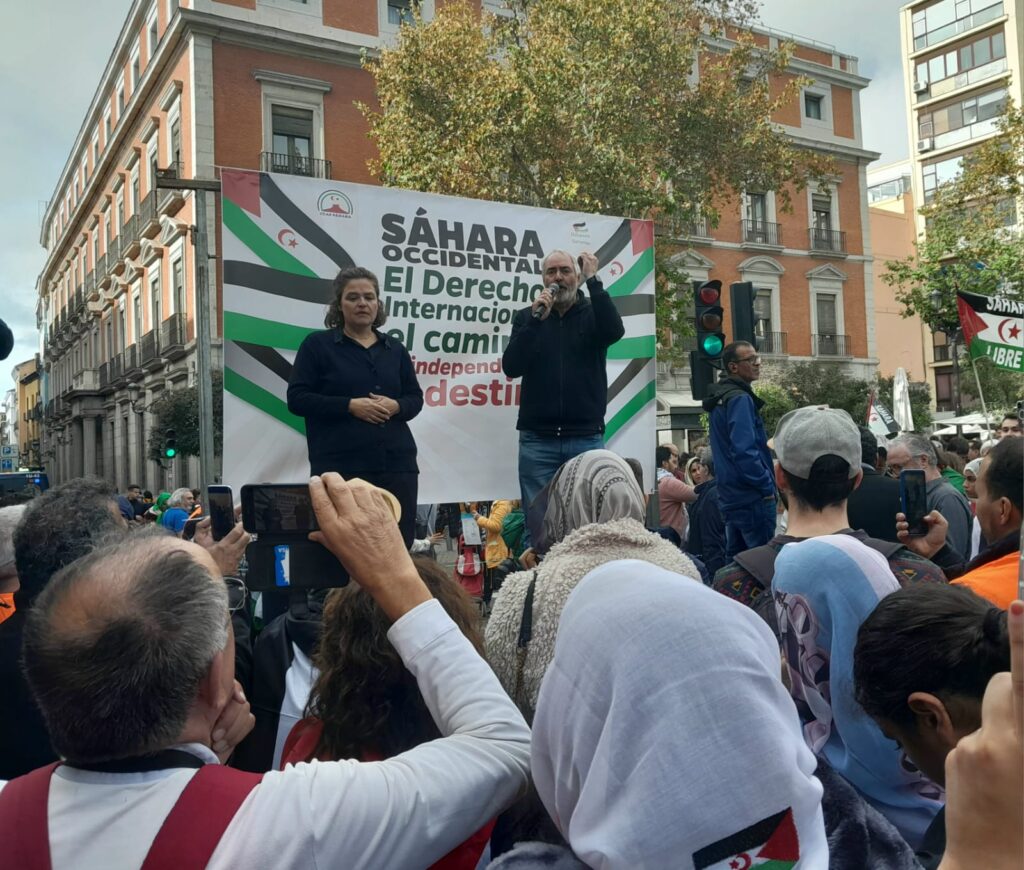
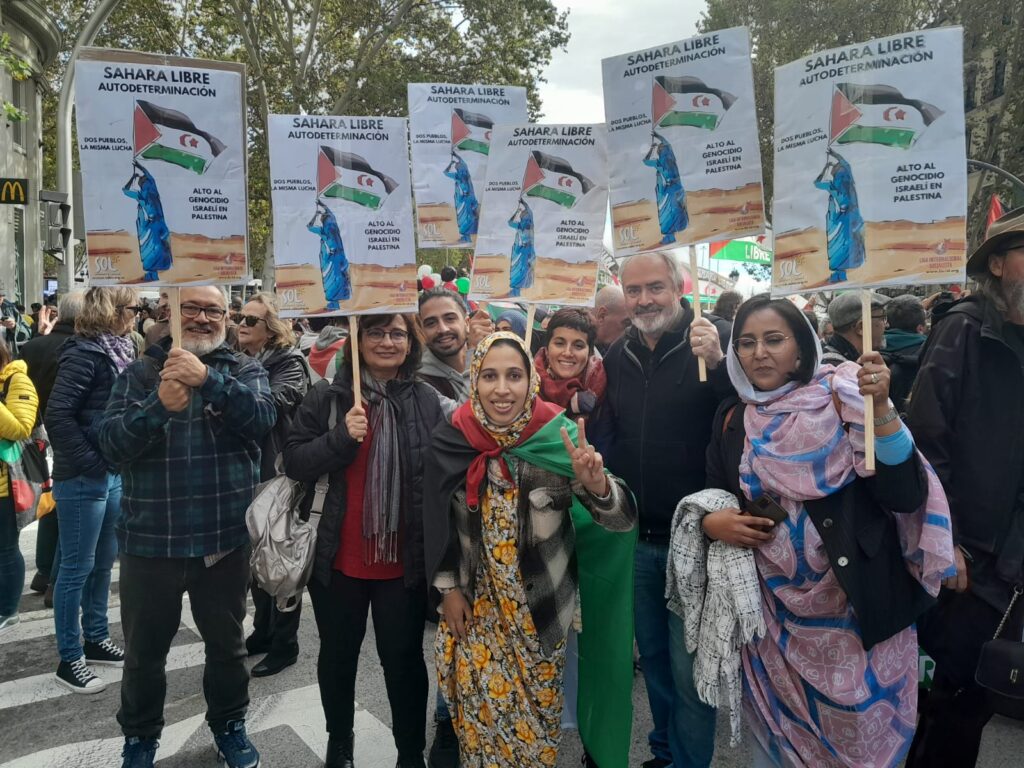
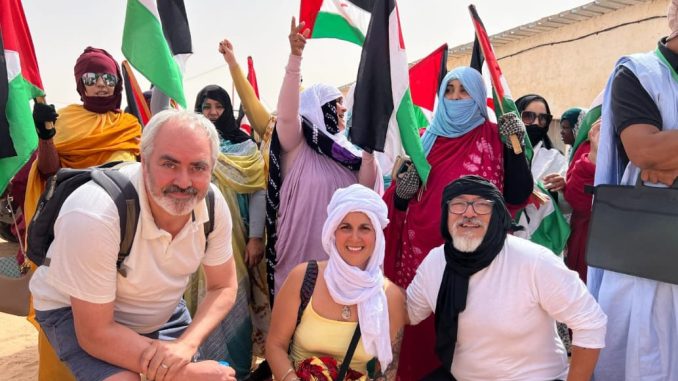
Western Sahara: Some featured dates [1]
The antecedents of the pre-Hispanic time in the region indicate the presence of different peoples, among which the arrival of the Arabs was decisive. The Sahrawi society was nomadic; socially, community life was the uniting factor that guaranteed survival within the framework of a fragile production, essentially livestock. The system of government varied over time, with the predominance of non-institutional personal authority, although there were assemblies of notables or free parliaments. Already in the Modern Age, the first Spanish approach dates back to the conquest of the Canary Islands by the crown of Castile in the 15th century, in dispute with the kingdom of Portugal. The timeline presented below is not intended to be detailed, but rather to highlight some important dates.
1476
The first Spanish establishment on the Saharan coast, with the Santa Cruz de la Mar Pequena fort.
1860
African War, Spanish victory in the Battle of Tetuán, signing of a peace treaty and settlement in the region.
1884
The Berlin Conference was held, in which the European imperialist powers divided up the African continent. Later there were new agreements in 1900, 1904 and 1920. At the Conference, Spain claimed the region located between Cape Bojador and Cape Blanco.
1885
Construction of Villa Cisneros and establishment of factories in Río de Oro and Cabo Blanco.
During the 20th century, the African territories under colonial domination in the areas of the Rif, Cape Juby, Spanish Sahara, Ifni and Spanish Guinea will be identified with the name “Spanish Africa”.
1946
July: The administrative unit Spanish West Africa (AOE) is created, similar to French West Africa.
1950
The process of decolonization of Africa begins, ending in 1975, with large national liberation movements, mobilizations, popular revolts, changes of regimes and states. As part of the process, the wars of: Algeria (French Algeria), Angolan Independence (Portuguese Angola), the Congo crisis (Belgian Congo), the Mau Mau uprising (British Kenya) and the Nigerian Civil War in the state of Biafra.
1957-1958
War of Ifni, undeclared by Spain and France, against Morocco.
1960
December 15: The Special Committee on Decolonization of the United Nations recognizes Western Sahara as one of the Non-Self-Governing Territories.
1963
In Tinduf and Hassi Beida, repeated border incidents between Morocco and Algeria transformed into an open war known as the Sand War between Morocco and Algeria. Ends November 5.
December 15: The Autonomy referendum of Equatorial Guinea is held in the Spanish provinces of Fernando Póo and Río Muni (Spanish Guinea).
1970
The UN approves Resolution 2711 that requests Spain to hold a referendum on self-determination of the Spanish Sahara within the framework of decolonization.
1973
May 10: The Polisario Front is founded as a Sarahui national liberation movement. It was born as a legitimate representative of the claim for Western Sahara through the armed struggle against the Spanish occupation until 1975, which continued against the subsequent invasion of Mauritania and Morocco and currently includes the Moroccan occupation.
1974
Spain agreed to hold the referendum, due to international pressure and the actions of the Polisario Front, opposed by Morocco. Spain’s promises were betrayed, and it collaborated with the Moroccan invasion. Ceuta and Melilla, in African territory, were also in dispute.
1975
November 6: When Madrid was preparing to abandon the Spanish Sahara within the framework of decolonization, Morocco carried out the “Green March” and invaded the territory in which the Sahrawis aspired to form. It does so with 300,000 civilians and armed military units camouflaged among them, with support from the US Department and France, to counteract the regional influence of Algeria that was aligned with the Soviet bloc. Hassan II also does so for internal reasons, his throne was threatened by the prolonged crisis and repression of Hassan of the so-called “years of lead”.
November 14: The Madrid Accords is signed between Spain, Morocco and Mauritania to temporarily regulate the territory that Spain abandons as the administrative power. But it turned out to be a “weak paper” and made possible the occupation of Western Sahara by Morocco and Mauritania, from which the war began.
November 20: Dictator Francisco Franco, who was totally opposed to the tripartite agreement, dies.
October 30: Moroccan army troops cross the northwest border of Western Sahara and confront Polisario troops. In Tindouf, Algerien, the Polisario Front establishes Camps for Sahrawi Refugees who were forced to leave their homes. Its administrative capital is Rabouni, founded in 1976, it houses the parliament, presidency, ministries and the Administration of the SADR.
1976
January 12: In Villa Cisneros, Dakhla, the last Spanish troops embark.
February 26: The last Spanish officers and administrators withdraw and the handover to the Moroccan troops entering the territory is completed. A fierce Sahrawi resistance breaks out.
February 27: The Polisario Front proclaims the Sahrawi Arab Democratic Republic (SADR).
April 14: Mauritania and Morocco sign an agreement to share the country: the northernmost two-thirds for Morocco and the remaining third for Mauritania.
1979
Mauritania is defeated by the Polisario Front and the Algiers Agreements are signed, but its place is taken by Morocco, which proclaims its sovereignty over the entire territory of Western Sahara.
1980
Construction of the Security Wall begins. The partial defeat of the Moroccan army and the casualties led it to build the Wall of Shame as a fortification to prevent the return of the Sahrawi exiles, protect the triangle formed by the fabulous phosphate deposits of Bou Craa, Laayoune and its port and Smara and corner the Polisario. The construction carried out in sections ended in 1987.
1982
The Organization of African Unity (OAU) admits the SADR, and two years later Morocco withdraws. It was admitted, from which Morocco withdrew in 1985.[2]
1984
Gaddafi’s Libyan government negotiates with Morocco and stops sending weapons to Polisario.
1988
International recognition of the SADR reaches 61 countries.
1991
They agree to the ceasefire proposed by the UN and the Settlement Plan established by MINURSO for a referendum, which does not materialize due to differences with the voting census to be adopted.
2007
King Mohamed VI presents his autonomy plan to the United Nations, which gives Western Sahara some powers, but based on Moroccan sovereignty and submission to the central government that retains defense, foreign affairs, currency, flag and religion.
2020
End of the truce and return of war confrontations following the Moroccan army’s repression of the Sahrawi demonstrations at the Guerguerat pass.
2021
September 29: The European General Court (EGC) annuls the fishing and agricultural agreements between Morocco and Europe. The Court ruled that the Sahrawi people, represented by the Frente POLISARIO, constitute a third party in EU-Morocco relations, whose consent is required for any international agreement applicable to Western Sahara, regardless of the alleged benefits.
2022
Spanish President Pedro Sánchez changes the country’s historical position for self-determination, replacing it with the Moroccan autonomy plan.
2023
In the UN General Assembly, Pedro Sánchez supports the work of the special envoy of the UN Secretary General despite his anti-Sahrawi turn.








